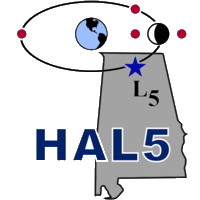Experiments, Modeling, and Theoretical Efforts in Fusion, Artificial Gravity, and Breakthrough Propulsion at the Charger Advanced Power and Propulsion (CAPP) Laboratory at UAH
Thursday, April 11, 2024 at 5:30 pm at Huntsville-Madison County Main Public Library Main Auditorium, with Dr. Jason Cassibry.

Join HAL5 as we welcome Dr. Jason Cassibry. The Charger Advanced Power and Propulsion (CAPP) laboratory at UAH Is pursuing a collection of advanced topics to assist in transforming terrestrial power, propulsion, and human space flight. CAPP is intended as a research and training center for students and young professionals to develop skill sets and exciting careers that will transform society. In this talk, we will discuss our pulsed power experiments and numerical modeling of variations on magneto-inertial fusion (MIF), in which we seek a solution space for fusion breakeven in a small footprint reactor for both power and propulsion applications. High voltage dielectrophoresis (10-50 kV) experiments at CAPP have shown that we can generate a body force on nonconductive materials with an equivalent acceleration of 33% of Earth's gravity. Scaling and prospects for simulating 100% Earth gravity for creating a voltage controlled artificial gravity environment for crewed deep space missions will be discussed. Finally, we have a collaboration with the ZC Institute, which is a consortium of scientists working on field distortion technologies (i.e. warp drive). The latest insights from the group will be shared.
About Dr. Jason Cassibry

Dr. Jason Cassibry is a professor in the Department of Mechanical and Aerospace Engineering and affiliated with the Propulsion Research Center
at the University of Alabama in Huntsville. His research includes theoretical and experimental study of magneto-inertial fusion and fission/fusion
for interplanetary space travel and terrestrial power, high voltage applications of dielectrophoresis, and advanced nuclear thermal propulsion
concepts.
Dr. Cassibry has 20 years past the PhD in numerical modeling and experiments for advanced propulsion applications. He has secured approximately
$5M in research funding mostly in the area of fusion, advanced propulsion, and multidimensional numerical modeling of smooth particle hydrodynamics.
Sponsorship has come from a variety of federal, state, and industrial sources, including NASA, DOE, ARPA-E, MDA, FBI, NSF, The Boeing Company,
HyperV Technologies, Nearstar, Lunar Resources, and numerous others. Significant developments include building and running three pulsed power
laboratories and producing a 3D smooth particle hydrodynamic code SPFMax to which has been funded to study magneto-inertial fusion, centrifugal
thermal nuclear rockets, and pulsed magnetic nozzles.
He is currently the PI of the Charger Advanced Propulsion and Power (CAPP) pulsed power facility being utilized for z-pinch applications for propulsion,
terrestrial power, and defense and research into high voltage applications of dielectrophoresis. He won the SciQuest 2013 Quest for Excellence Award
in the area of Academia in August 2013 and the Konrad Dannenberg Educator of the Year Award in May 2013. He was a coauthor on the AIAA Best Paper by
the AIAA Nuclear and Future Flight Propulsion Technical Committee, AIAA 2014-3520 “Developing the Pulsed Fission-Fusion (PuFF) Engine” which was
awarded in April 2014. He was recently awarded “Outstanding Faculty Member for the College of Engineering for the University of Alabama in
Huntsville.” in 2021. He is the former chair of the AIAA Nuclear and Future Flight Committee..
The event is free and open to the public. A social will be held after the meeting.
